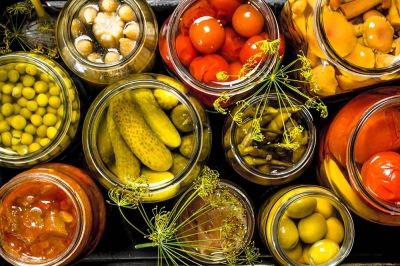To supply traditional pickles in global markets, it is important that the products are standardized and properly packaged, which includes the selection of quality raw materials, compliance with the pickle preparation process, the use of quality preservation methods such as pickling and suspension processes, and attractive and appropriate packaging design

The first step for the supply and export of traditional Pickles is to research the world markets. Examining the needs, demand, competition and prices in different markets allows the housewife to understand whether her traditional pickles are welcome in the world markets or not. To supply traditional pickles in global markets, it is important that the products are standardized and properly packaged, which includes the selection of quality raw materials, compliance with the pickle preparation process, the use of quality preservation methods such as pickling and suspension processes, and attractive and appropriate packaging design. . To supply to global markets, it is necessary to create a strong and effective distribution network. A housewife can develop her home products distribution network by communicating with importers, traders and distributors in different countries. Also, the use of internet channels and online sales can also help to supply to the global market.
To attract customers in global markets, a strong and unique brand can be created for traditional pickles. The use of high-quality raw materials, traditional and local processes, the story and history of the product, and providing added value such as organic products, without artificial additives and maintaining high quality can help create a strong brand. Communicating and collaborating with organizations, associations, and export fringers can help a housewife tap into their guidance, resources, and network. This includes export consultations, market information, payment methods and government support. In the global market, it is very important to maintain product quality and provide timely and quality customer service. Satisfying customers and building trust in new markets helps the housewife to expand her customer network and establish sustainable business relationships.
In some regions and countries, homemade pickles with local flavor and style are very popular. Consumers in these regions value traditional pickles and often trust them more. As a result, homemade pickles in these markets can have more customers. Pickles produced in industrial factories may be produced according to strict industrial and sanitary standards and have higher quality. This issue may attract more customers in the global market who pay attention to standards and quality. Industrial factories can produce pickles on a larger scale and operate on an export scale. This makes pickles produced in factories more widely present in the world market. Industrial plants usually have more professional packaging and transportation facilities, which makes the pickles produced in them more suitable and of higher quality for sending to global markets. This issue can attract pickles produced in factories to international customers. Industrial plants usually have more resources for marketing and advertising. This allows them to spread the produced pickles more widely and globally and cover more of the market.
To introduce her traditional pickles in global markets, the housewife can use different marketing methods. Creating a website or official pages in social networks, using images and attractive content, trade exhibitions and participating in related events can help to introduce and promote traditional pickles. Before starting the export activity, the housewife should completely ignore the export regulations and laws of her country. This includes regulations on packaging content, labelling, export licenses, health and hygiene standards, and export tariffs and taxes. It is important to comply with these regulations so that export performance is done properly and to minimize possible legal and psychological problems.
The first step to obtain the necessary standards for the export of homemade pickles is to study and understand the laws and regulations related to export in your country. This includes health regulations, raw materials, packaging, labeling, and other export requirements. Referring to specialists and experts in the field of export and health can help the housewife to understand the necessary standards and receive the necessary guidance. Specialists can advise on the process of production, packaging, storage and other things that must be done in accordance with export standards. Participating in training courses related to export and health and industrial standards can help the housewife to get the necessary information and improve the required skills. These courses can be organized by organizations, educational centers or related associations. Housewives can prepare reference sources and guides related to export standards and study them. These guidelines can include technical specifications, health tips, packaging requirements, production steps and other items related to the export of homemade pickles.
To obtain export standards, it may be necessary to perform tests and inspections related to the pickle industry. A housewife can use the services of laboratories and inspection centers to check her products and ensure compliance with export standards. Some countries need to register and obtain special licenses for the production and export of pickles. A homemade pickle producer should contact the relevant authorities in his country and start the process of registration and obtaining permits. In order to produce pickles for export, it is necessary for the producer to pay attention to health documents and related standards. This includes the use of quality raw materials, compliance with the cleaning and disinfection process, use of appropriate packaging and correct labeling, and other points related to hygiene and product quality. To facilitate the export process, you can cooperate with local export agencies. These institutions can help in the process of registration, issuing licenses, providing technical guidance and facilitating the process of exporting to different countries.




